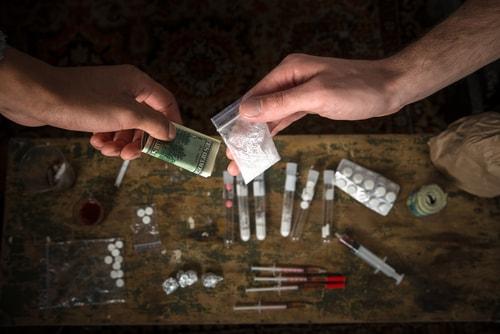Recent Blog Posts
New Tests Determine Whether Drivers Are Under the Influence of Drugs
 Every year, around 10,000 people in the United States are killed in car accidents involving a driver who was under the influence of alcohol. In recent decades, law enforcement agencies have increased their efforts to combat drunk driving, and they are now looking to enforce laws against driving while under the influence of illegal drugs.
Every year, around 10,000 people in the United States are killed in car accidents involving a driver who was under the influence of alcohol. In recent decades, law enforcement agencies have increased their efforts to combat drunk driving, and they are now looking to enforce laws against driving while under the influence of illegal drugs.
In 2015, the number of drivers who tested positive for drugs after being involved in a fatal accident was greater than the number of drivers who tested positive for alcohol. As more states legalize marijuana, and more people across the country abuse prescription drugs, opioids, and methamphetamine, police are looking to implement new tests that will allow them to make DUI arrests when drivers are under the influence of drugs.
Testing for Drugs
While the use of portable breathalyzers which test drivers’ blood alcohol content is common, until recently, police officers did not have methods for testing for drugs during traffic stops. However, new field tests have recently become available which use a mouth swab to test a driver’s saliva for the presence and quantity of drugs in their system.
Will Illinois Be the Next State to Legalize Recreational Marijuana?
 While the possession of marijuana is a criminal offense throughout much of the United States, its use is widespread, and support for marijuana legalization is growing. Currently, the recreational use of marijuana is legal in eight states and the District of Columbia, and 64% of Americans support legalization. As several other states consider ballot referendums or legislation to legalize marijuana, Illinois residents are wondering if our state may be the next in line to make this change.
While the possession of marijuana is a criminal offense throughout much of the United States, its use is widespread, and support for marijuana legalization is growing. Currently, the recreational use of marijuana is legal in eight states and the District of Columbia, and 64% of Americans support legalization. As several other states consider ballot referendums or legislation to legalize marijuana, Illinois residents are wondering if our state may be the next in line to make this change.
Current Illinois Marijuana Laws
In 2016, Illinois passed a law decriminalizing the possession of less than 10 grams of marijuana. While possession of marijuana is still considered illegal, anyone caught in possession of less than 10 grams will not be charged with a criminal offense; instead, they will face a civil fine of $100 to $200. Possession of more than 10 grams is a criminal offense ranging from a Class A misdemeanor to a Class 1 felony, depending on the amount of marijuana.
Understanding Gun Laws in Chicago and the State of Illinois
 Mass shootings occur with alarming regularity in the United States, and the most recent incident, in which a gunman opened fire on a crowd in Las Vegas on October 1, 2017, resulted in 58 deaths and 546 injuries. In the aftermath of this tragedy, debate about gun laws and gun control has resumed, and politicians and pundits have brought up a familiar talking point, stating that the city of Chicago has strict gun laws, but also a high rate of homicides. But while this is something that is often asserted, is it actually true?
Mass shootings occur with alarming regularity in the United States, and the most recent incident, in which a gunman opened fire on a crowd in Las Vegas on October 1, 2017, resulted in 58 deaths and 546 injuries. In the aftermath of this tragedy, debate about gun laws and gun control has resumed, and politicians and pundits have brought up a familiar talking point, stating that the city of Chicago has strict gun laws, but also a high rate of homicides. But while this is something that is often asserted, is it actually true?
In order to clear up confusion about this issue and provide some context about the weapons charges people may face, here is some information about the laws concerning gun ownership in Chicago and the state of Illinois:
Weapons Licenses
While Chicago did place a ban on the sale and registration of handguns in 1982, this ban was ruled unconstitutional by the U.S. Supreme Court in 2010. Following the passage of a new law by the Illinois General Assembly in 2013, concealed carry of firearms is now legal in Illinois, bringing the state’s gun laws in line with much of the rest of the country. Under Illinois law, the sale and ownership of firearms is legal throughout the state, with the following conditions:
Illinois Criminal Justice Reforms Offer Second Chances to Offenders
 Being arrested and charged with a crime will have major, long-lasting effects on anyone’s life. When someone enters the criminal justice system, their criminal record can follow them for the rest of their life. In Illinois, nearly 50 percent of ex-offenders end up back in prison within three years due to their inability to find work.
Being arrested and charged with a crime will have major, long-lasting effects on anyone’s life. When someone enters the criminal justice system, their criminal record can follow them for the rest of their life. In Illinois, nearly 50 percent of ex-offenders end up back in prison within three years due to their inability to find work.
After someone has been convicted of criminal charges and served their sentence, they may be able to have their criminal record sealed, which will improve their ability to find jobs, education, and housing. Unfortunately, the process of sealing these records is often difficult, but the state of Illinois is working to implement criminal justice reforms to address this issue.
New Illinois Criminal Justice Laws
In order to help ex-offenders return to work and avoid future prison sentences, Governor Bruce Rauner recently signed several new laws intended to help provide a second chance to these offenders. These laws include:
Statute of Limitations on Child Sex Crimes Eliminated in Illinois
 On August 11, 2017, Illinois Governor Bruce Rauner signed a new law eliminating the statute of limitations for felony sexual assault and sexual abuse crime against children. This law went into effect immediately, and officials praised the law, stating that will make it easier to prosecute these crimes.
On August 11, 2017, Illinois Governor Bruce Rauner signed a new law eliminating the statute of limitations for felony sexual assault and sexual abuse crime against children. This law went into effect immediately, and officials praised the law, stating that will make it easier to prosecute these crimes.
Changes under the New Law
Prior to the passage of this law, Illinois statutes required sexual offenses against children to be reported and prosecuted within 20 years of the child’s 18th birthday. The new law eliminates that statute of limitations altogether, and it applies to any future crimes or existing crimes for which the statute of limitations had not yet expired. Following this change, 37 states and the federal government have removed the statute of limitations for some or all sex crimes against children.
This law helps ensure that victims of these crimes will be able to speak up and seek justice when they are ready to do so, even if that is years or decades after the abuse occurred. “Sex crimes against children are a horribly tragic violation of trust that can take a lifetime to recover from,” said Illinois Attorney General Lisa Madigan. “This new law will ensure that survivors are provided with the time they need to heal and seek justice.”
Criminal Charges in Drug Cases May Include Drug-Induced Homicide
 The abuse of heroin and opioids has become a major health crisis in the Chicago area; more than 1,000 people died of drug overdoses in Cook County in 2016, which was a significant increase over the 693 drug overdose deaths in 2015. Law enforcement officials are working to combat this epidemic, and some advocates have encouraged them to charge drug dealers with drug-induced homicide in addition to standard drug charges.
The abuse of heroin and opioids has become a major health crisis in the Chicago area; more than 1,000 people died of drug overdoses in Cook County in 2016, which was a significant increase over the 693 drug overdose deaths in 2015. Law enforcement officials are working to combat this epidemic, and some advocates have encouraged them to charge drug dealers with drug-induced homicide in addition to standard drug charges.
Drug-Induced Homicide in Illinois
In Illinois, a person can be charged with drug-induced homicide if they provided illegal drugs to someone and the use of those drugs resulted in that person’s death. Drug-induced homicide is a Class X felony, and it is punishable by 15 to 30 years in prison.
While Chicago has seen increasing numbers of deaths from drug overdoses, charges of drug-induced homicide are still relatively rare in Cook County. However, the counties surrounding the Chicago area have seen a rise in these types of cases. Between 2013 and 2016, there were 17 cases in Lake County, 15 cases in Will County, 14 cases in DuPage County, eight cases in McHenry County, and five cases in Kane County. During this period, only five drug-induced homicide cases were prosecuted in Cook County.
Understanding Civil Asset Forfeiture Laws in Illinois
 Anyone who has been arrested on criminal charges faces a great deal of financial hardship, including bail, court fees, fines, attorney’s fees, and the possible loss of income. But what many people do not know is that when they are arrested, police can seize their money or property if they believe that it was used to commit a crime. This is known as civil asset forfeiture.
Anyone who has been arrested on criminal charges faces a great deal of financial hardship, including bail, court fees, fines, attorney’s fees, and the possible loss of income. But what many people do not know is that when they are arrested, police can seize their money or property if they believe that it was used to commit a crime. This is known as civil asset forfeiture.
While civil asset forfeiture is meant to provide law enforcement with tools to disrupt the activities of large scale criminal organizations, the practice has come under fire in recent years due to its increased use in a wide variety of criminal cases. Organizations such as the American Civil Liberties Union (ACLU) have argued that law enforcement officials disproportionately target lower-income individuals who do not have the resources to prove their innocence and reclaim their property.
Shoplifting and Retail Theft
 It is estimated that there exist approximately 27 million shoplifters in the United States. That means that one in 11 people have shoplifted at some point in their lives. In the last five years, over 10 million of those people have been caught. Shoplifting is so prevalent that there is even a community of proud shoplifters showing off pictures of items they have swiped on the social networking website Reddit. The community, which has over 30 thousand subscribers, is a forum for shoplifters to share methods, advice, and tricks of the trade. The welcome message touts “Welcome to Shoplifting! If you're here to preach morals, enjoy your very brief stay. If you're here to learn and share, please help contribute to our wonderful community of allegedly corrupt and soulless individuals.”
It is estimated that there exist approximately 27 million shoplifters in the United States. That means that one in 11 people have shoplifted at some point in their lives. In the last five years, over 10 million of those people have been caught. Shoplifting is so prevalent that there is even a community of proud shoplifters showing off pictures of items they have swiped on the social networking website Reddit. The community, which has over 30 thousand subscribers, is a forum for shoplifters to share methods, advice, and tricks of the trade. The welcome message touts “Welcome to Shoplifting! If you're here to preach morals, enjoy your very brief stay. If you're here to learn and share, please help contribute to our wonderful community of allegedly corrupt and soulless individuals.”
What Happens If I Refuse a Breathalyzer?
 You can probably imagine what it feels like to be pulled over by the police on a night where you have had a few drinks, even if it has never happened to you before. The lights flash behind you and your heart sinks. By the time the officer is at your window, you are probably extremely nervous, but you want to make this go as smooth as possible so that you get home quickly. As expected, the officer asks if you have been drinking, and you honestly answer that you had a couple earlier. Then, the officer asks if you will take a breathalyzer test. Can you refuse?
You can probably imagine what it feels like to be pulled over by the police on a night where you have had a few drinks, even if it has never happened to you before. The lights flash behind you and your heart sinks. By the time the officer is at your window, you are probably extremely nervous, but you want to make this go as smooth as possible so that you get home quickly. As expected, the officer asks if you have been drinking, and you honestly answer that you had a couple earlier. Then, the officer asks if you will take a breathalyzer test. Can you refuse?
Understanding the Law
According to Illinois law, drivers give their implied consent to submit to blood alcohol content (BAC) testing by operating a motor vehicle on the streets and roadways of the state. There is an important caveat, however. Implied consent only refers to testing that is conducted incident to an arrest for driving under the influence (DUI). This means that you are under no obligation whatsoever to take a BAC test unless and until you have been arrested on suspicion of DUI. Regardless of what the officer tells you, if you have not been arrested, you cannot be forced to take a breathalyzer.
What You Should Know About Probation
 If you are facing criminal charges, you may be overwhelmed by the legal process that lies ahead. Depending on the nature and severity of the alleged offense—along with your own criminal history—you could be eligible for probation in lieu of serving time in jail. But, what is probation and who qualifies? A skilled criminal defense attorney can help you make sense of a challenging situation.
If you are facing criminal charges, you may be overwhelmed by the legal process that lies ahead. Depending on the nature and severity of the alleged offense—along with your own criminal history—you could be eligible for probation in lieu of serving time in jail. But, what is probation and who qualifies? A skilled criminal defense attorney can help you make sense of a challenging situation.
What Is Probation?
Probation is a sentencing alternative that offers offenders substantially more personal freedom while they serve their sentences. In most cases, an offender on probation can live at home, go to work, and live most of a normal life, but always under the close supervision of a probation officer. An individual on probation is required to abide the terms set by the court and his or her behavior is closely monitored. In some cases, probation begins immediately upon a finding of guilt while in others, it begins after a reduced jail sentence.





 773-276-5541
773-276-5541










